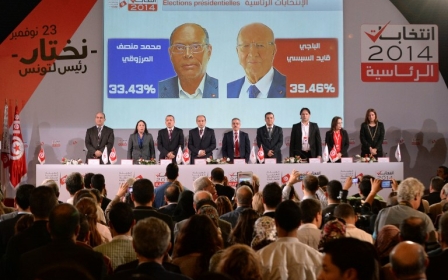Tunisia's parliament holds first session, as court rejects Marzouki's election challenge

Tunisia's newly-elected parliament held its first session on Tuesday in capital Tunis.
Ali bin Salem, the assembly's oldest parliamentarian, led the session after a brief opening statement by Mustapha Ben Jaafar, the head of the country's outgoing Constituent Assembly.
"Tunisia has managed to secure a peaceful power transfer in a fluid and civilised manner that will ensure the gradual introduction of democratic traditions," he told deputies, after singing the national anthem.
In the session parliamentarians voted to elect a speaker and two deputies and established a committee to draft the new assembly's bylaws.
The 217-member House of People's Representatives was the product of Tunisia's democratic parliamentary elections held on 26 October.
The Nidaa Tounis Party, which describes itself as centrist, secured the most seats by a single party, winning 86 seats in the parliamentary election, while the religiously conservative Ennahda movement garnered 69 seats.
Over 60 percent of Tunisia's 5.2 million eligible voters turned up for the parliamentary polls, the first since a 2011 uprising ousted long-time leader Zine al-Abidine Ben Ali.
Presidential elections are underway too, with a first round of voting completed on 23 November.
At this stage Nidaa Tounes’ leader Beji Caid Essebsi leads incumbent leftist politician Moncef Marzouki by 39.4 percent to 33.4 percent, or 1.9 million votes against 1.1 million votes.
Marzouki contested the legitimacy of the outcome citing “attempts to prevent him from casting his ballot, breaches of regulations on electoral silence, and lack of neutrality along with fraud and forgery.”
However, his appeal was thrown out of court on Monday: “The court told [Marzouki’s] campaign orally that the appeal has been rejected,” his campaign director Genidi Taleb told Anadolu Agency (AA).
He said that Marzouki's campaign will meet later to discuss the court decision.
Election commission member Nabil Bafoun said that the court will issue a written verdict on Tuesday.
He said if Marzouki deicded not to challenge the court decision, the second round of the polls will be held on 14 December.
"If the decision is challenged, the vote will be held on December 21," he added.
The second round of voting will see a runoff between Marzouki and Nidaa Tounes’ Essebsi.
Stay informed with MEE's newsletters
Sign up to get the latest alerts, insights and analysis, starting with Turkey Unpacked
Middle East Eye delivers independent and unrivalled coverage and analysis of the Middle East, North Africa and beyond. To learn more about republishing this content and the associated fees, please fill out this form. More about MEE can be found here.




